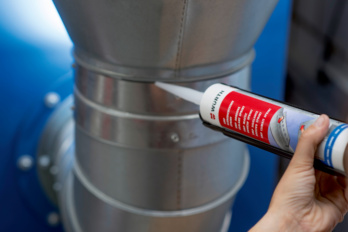The images are examples. For detailed information, other images and documents, please select individual articles from the following table.
SMP adhesive sealant SPRINT
Rapid-curing, permanently elastic SMP-based adhesive and sealant with high temperature resistance
Register and access more than 75 000 products







Variants
Register and access more than 75 000 products
Call customer service: 010 308 6700
Prices for customers after login
Fast-drying
Shorter processing time, as further processing of the material can occur more quickly
Excellent adhesive range
- Very good adhesion to almost all surfaces, mostly without primer
- Adheres to damp surfaces and underwater (for temporary repairs)
** The service life of the repair depends on various factors such as substrates, water contents (chlorine, lime, dirt etc.) etc., therefore it is not possible to give an exact timing. The durability of the repair cannot be guaranteed. Bonding/sealing work must be carried out as quickly as possible in a dry state!
- Not corrosive to metals
- Compatible with natural stone - does not leave stains on porous surfaces
Good resistance
- Resistant to weathering and UV, colour-fast
- Waterproof and seawater-resistant
High temperature resistance
Suitable for powder coating
Permanently elastic once cured
Compensates for uneven surfaces and material stresses
Coating compatibility
Can be painted with most commercially available paints before skin formation (wet in wet)
Can be sanded after hardening
Free of isocyanates, phthalates, solvents and silicones
Our products featuring the EMICODE label are low emission/environmentally compatible. The EMICODE classification system awards labels to construction products that comply with the very stringent health and environmental requirements of recognised institutes.
- PMMA and polycarbonate must only be glued when not under tension; otherwise, stress cracks are likely to occur. In the case of polycarbonate, we always recommend preliminary tests.
- In general, for plastics, it must be ensured that the release agents used in production or the protective films used for transport are removed without residue before bonding, as these sometimes considerably worsen adhesion.
- For plastics containing softeners (e.g. soft PVC, butyl rubber, EPDM and APTK), incompatibilities such as discolouration and loss of adhesion can result. Suitability in this respect should be systematically tested.
- Although the SMP adhesive sealant SPRINT has excellent adhesion on aluminium and cement fibre panels, stated applications do not include bonding of facade panels.

The usage instructions are recommendations based on the tests we have conducted and are based on our experience; carry out your own tests before each application. We do not assume any liability for a specific application result due to the large number of applications and storage and processing conditions. Insofar as our free customer service provides technical information or acts as an advisory service, no responsibility is assumed by this service except where the advice or information given falls within the scope of our specified, contractually agreed service or the advisor was acting deliberately. We guarantee consistent quality of our products. We reserve the right to make technical changes and further develop products.
For structural bonds in general, automotive, aerospace and construction industries, as well as in container, bodywork, vehicle, caravan, wagon, apparatus, metal, plant, air-conditioning and ventilation system construction etc.
Suitable for stress-free structural bonding between metals and plastics. For sealing and bonding in metal constructions, sealing of welding seams and folded seams, and sheet connection joints that are subsequently thermo-painted.
The application surfaces must be clean, dry and free of grease. For pre-treatment, refer to the technical data sheet.
Cut off thread cap, screw on nozzle and cut to the required width. Apply the adhesive using a suitable application gun. Apply adhesive in vertical beads. Place the workpieces in the correct position within the skin formation time and press these together to ensure that the thickness of the adhesive is at least 2–3 mm between the material and surface.
Select RAL-colour code
!! NOTE: On-screen visualisation of the colour differs from real colour shade!!







